Just another dude who writes ‘Star Wars’ essays in my free time. Collected 773 George Lucas quotes to this day, and 936 from other SW creators/authors/execs.
Don't wanna be here? Send us removal request.
Note
What are your thoughts on Pablo suggesting Qimir might not be in the line of Banite Sith in the Acolyte Visual Guide. I believed he was the Apprentice of Plagueis as hinted by the writer of the show. If he wasn't Plagueis apprentice how could he be a Sith as who could have trained him? What is your take on Pablo's comments pls?
Well, Leslye Headland didn't just hint Plagueis is Qimir's master. She outright stated it.
“[We put the Darth Plagueis cameo in the series because] we wanted to show Qimir’s master.” - Leslye Headland, Entertainment Weekly, 2024
I think the direction they were taking Qimir in was one in which he either dies at Plagueis' hands, or breaks away from the Sith and forms the Knights of Ren.
For me, the key takeaway from Pablo Hidalgo's blurb in the Visual Guide is that - seeing as The Acolyte won't be brought back - that there is so many directions they can take these characters' stories.
Yes, the intended narrative is that Qimir is Plagueis' apprentice... but maybe down the line, another writer will come along and say that he wasn't, he was just a cosplayer. That's all that Pablo's line opens the door for, really.
Transmedia writing is one big improv show, nowadays. There's a lot of "yes and" rather than "nu-uh!" mainly because it's all made in good fun, and you don't wanna be the Karen (Traviss) who's going "nu-uh! I'm telling!"
Filoni's approach to this all is that these are all campfire stories, so inconsistencies aren't too much of an issue. Personally, I agree with this approach, to a degree...
Take the tonal whiplash, going from Kenobi which can at times feel cartoonish, not unlike how the Prequels did, and Andor which opens with the titular character shooting someone in the face.
It's a vast galaxy, and multiple genres merely reflect that more.
If the Kenobi team had written/directed the same story, we would've gotten that more cartoonish tone... that doesn't mean the in-universe events never happened, it just means the different creatives telling us how they happened do so differently.
20 notes
·
View notes
Text
this is canonically happened after ROTJ, btw.
Via SW_Holocron
111 notes
·
View notes
Text

I'm going to have SO much fun with this :D :D :D :D :D
Edit: Final tally is 27 inaccurate/misrepresented statements :D
#i'm literally wheezing#I'm at 1:58 into the video and I've already found SIX things GL - Theory's IDOL - has stated to the contrary of#this is so fucking funny#updating this as i go along#3:28 and we're at ELEVEN NOW Y'ALL
77 notes
·
View notes
Text

Obi-Wan being "crumpled over on the ground" is unacceptable, so now he's tearing up the dance floor.
So my friend got me some of these old Star Wars Insider magazines from when the prequels were coming out
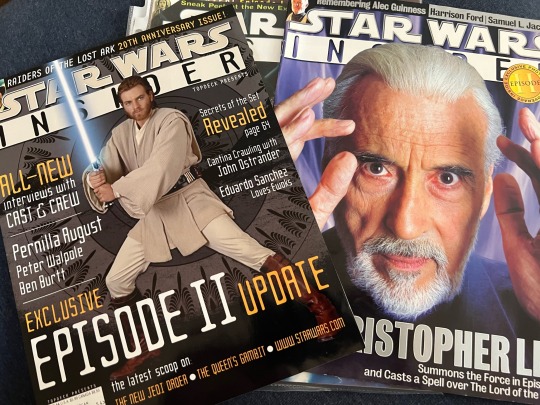
And they’re really fun and gorgeous and making me miss physical media dearly. But this image specifically is absolutely killing me:

A ‘hand-picked’ image by George Lucas, and it’s just fucking Obi-Wan crumpled over on the ground in the most pathetic way possible. 10/10 perfect no notes.
2K notes
·
View notes
Text

Happy Star Wars day everyone!
36 notes
·
View notes
Text
Me: Darth Sidious! The story about Plagueis is bullshit because there’s no way a Sith Lord who has “people he cares about” ever existed. 
Darth Sidious: well that is just mean and prejudiced. I’m a Sith and I care about people.
Me: oh yeah? Who?
Darth Sidious: well, me mostly. But I’m people. That still counts! 
81 notes
·
View notes
Text
Good ol' George Lucas quote to support this:
"[Palpatine has been grooming Anakin by] saying that “My mentor told me that there was a way that you could stop death.” Which was a lie. They can’t. Anakin got sold a bill of goods because he wanted it so bad that he’d believe anything anybody would sell him. It's a scam." - The Star Wars Archives: 1999-2005, 2020
I mean, even WITH the 'Darth Plagueis' book, the point still stands because all Plagueis really does is bringing back his test subjects - not random people or loved ones - back to life after doing HEAVY testing on them for years.
Like, it's not some miraculous thing like when Anakin and the Mortis Daughter save Ahsoka. He's killing this dude named Venamis - who he has done THOUSANDS of tests on - and then just to see if it's possible, reviving him. Then killing him, reviving him, over and over. It's necromancy, not immortality.
So even with the book… the substantive parts of Palpatine's tale are indeed all made up. Just calling what he says a "half-truth" is already EXTREMELY generous because…
A "Sith legend?" These events happened like 13 years ago buddy, there's only been like 2 Sith since then. How is this a legend?
Plagueis could create life? Yeah, sure. But like… we're talking about something small, like a bacteria, here. Nothing from scratch, nothing worth bragging about.
Plagueis could save the people he cared about from death? He could revive SPECIFIC test subjects, sure, after A LOT of preparation, but c'mon. Plagueis never cared about anyone.
And that's if you do go by the book.
If you go by George's word, then the only true part of the tale is that Palpatine had a Sith Master named Darth Plagueis, who he killed.
"He did kill [Plagueis]. That is what apprentices do." - Celebration V, Main Event, 2010
That's it.
None of that other "create life" or "save loved ones" BS is true, it never happened.
I'm going to climb up on a new hill to die on: I THINK PALPATINE'S PLAGUEIS STORY IS 100% MADE UP BULLSHIT. If you discount supplementary material created by other authors, the only thing we know about Plagueis is that speech Palpatine gives at the bubble opera, one we already know is designed to manipulate Anakin, but watching Revenge of the Sith in the theater again, thinking about how Anakin will later parrot Palpatine's words exactly--I realized, oh, it's not just a story being used to manipulate Anakin, I think it's a story created to manipulate Anakin, right where Palpatine wants him. It's a story about a Sith lord who learns how to make people stop dying. A Sith Lord who wants to stop his loved ones from dying. We know Palpatine doesn't actually know how to do this--the movie seems to imply that Palpatine was Plagueis' apprentice, but I'm not so sure. Palpatine says that Plagueis taught his apprentice everything--which would include the saving people bit--but Palpatine doesn't know how to save people, he says that he and Vader will discover it together and Anakin doesn't go, "Hey, wait, I thought you were supposed to know this!", which throws unreliability onto Palpatine's story already. There's a lot Palpatine is doing in this movie to manipulate Anakin very specifically--he puts Anakin on the Council, knowing they will ask him to spy on the Chancellor and even "guesses" it before Anakin can say anything at the opera, that he suggests Anakin should be the one to go to Utapau knowing that the Council will vote for a more experienced Master, he reveals himself to Anakin knowing that Anakin will tell them and be forced to choose, he tells Anakin the Plagueis story knowing that Anakin fears Padme's death (he is likely aware of Anakin's emotions about this, being an evil psychic space wizard himself) and sets it up so that it's the perfect bait. The conversation in ROTS goes:
Palpatine: "Remember back to your early teachings. All who gain power are afraid to lose it. Even the Jedi." Anakin: "The Jedi use their power for good." Palpatine: "Good is a point of view, Anakin. The Sith and the Jedi are similar in almost every way... including their quest for greater power." Anakin: "The Sith rely on their passion for their strength. They think inwards- only about themselves." Palpatine: "And the Jedi don't?" Anakin: "The Jedi are selfless. They only care about others." Palpatine: "Did you ever hear the tragedy of Darth Plagueis the Wise? I thought not. It's not a story the Jedi would tell you. It's a Sith legend. Darth Plagueis was a dark lord of the Sith... so powerful and so wise... he could use the Force to influence the midi-chlorians... to create... life. He had such a knowledge of the dark side... he could even keep the ones he cared about... from dying." Anakin: "He could actually... save people from death?" Palpatine: The dark side of the Force is a pathway to many abilities... some consider to be unnatural." Anakin: "What happened to him?" Palpatine: "He became so powerful... the only thing he was afraid of was... Iosing his power. Which eventually, of course, he did. Unfortunately, he taught his apprentice everything he knew. Then his apprentice killed him in his sleep. It's ironic. He could save others from death... but not himself." Anakin: "Is it possible to learn this power?" Palpatine: "Not from a Jedi."
This entire conversation is a set-up to make Anakin think that it's not selfish to change his views, because it's just exactly as Anakin says the Jedi are selfless and only care about others that he starts the Plagueis story about this legendary Sith who just cared so much about his loved ones that he learned how to stop them from dying. But, oh, he couldn't stop himself from dying, he was only thinking of others! Not himself! Throughout the movie Palpatine is manipulating Anakin's thoughts so that Anakin will think in exactly the lines of thought that Sidious wants him to. ("Good is a point of view, Anakin." --> "From my point of view, the Jedi are evil!", "You know I'm not able to rely on the Jedi Council. If they haven't included you in their plot, they soon will." --> "I should have known the Jedi were plotting to take over!" Etc.) So when he wants Anakin to really consider using the dark side, he tells him a story about this mysterious Sith Lord who just wanted to save his loved ones, not himself, just those he cared about. It's the perfect way to give Anakin an excuse to take that first step that doesn't seem so bad, so against everything he knows is right, and think that it's okay if it's for someone else. It's not because he's so scared to lose someone he loves that he'll make a deal with the devil, no, he's just thinking of others, the ones he loves. The story is so perfectly designed to appeal to Anakin at this moment in time and so incongruent with everything else we know about Sith Lords and how the dark side works (the dark side is not a path to anything good), that I think it's 100% made up bullshit, just like everything Palpatine says to Anakin in this movie is a set-up to direct Anakin's thoughts where he wants them.
2K notes
·
View notes
Text

The rotten MAGA government gave no evidence.
Now you know why Republicans want to get rid of due process.
#for my parents who keep telling me that im fine because#“im italian and not a priority for ICE”#they don't need an excuse#they have a quota to fill and they'll fill it#what is this “due process” you speak of
6K notes
·
View notes
Text
Part 2.5 of the 4-part post series interweaving George Lucas' words in a curated meta post. Here are PART 1 and PART 2.
In George Lucas' words: The Fall and Return of Anakin Skywalker
- Does The Clone Wars count? -
When talking about why Anakin Skywalker falls to the Dark Side, it's easy for many fans to point to events that Anakin goes through in the series The Clone Wars.
However, while George Lucas himself stated he doesn't make a distinction between the series and the films, it's important to bear in mind why that series was created in the first place.
The Clone Wars connects Episode II and III. As a TV series, it gives more depth and understanding about how the Republic fell, and what a fantastic hero Anakin Skywalker was.
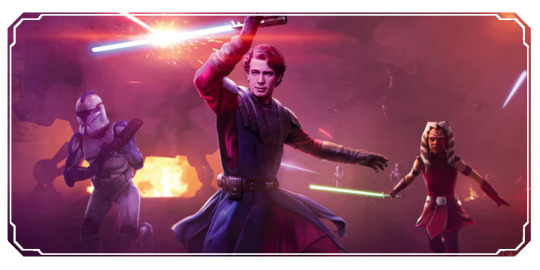
In-universe, this conflict is really the centerpiece of the downfall of the Jedi Order and the ultimate rise of the Empire, but in the films, we get so focused on Anakin turning into Darth Vader that it's easy to forget that he was one of the biggest heroes of the entire Clone War.
But as far as George is concerned, the Star Wars epic itself is basically this mythological uber story about one man: Anakin Skywalker. That is the saga shown in the six feature films, a narrow-focused story with a beginning, a middle and an end, the story of one man's struggle against evil and the redemption by his son.
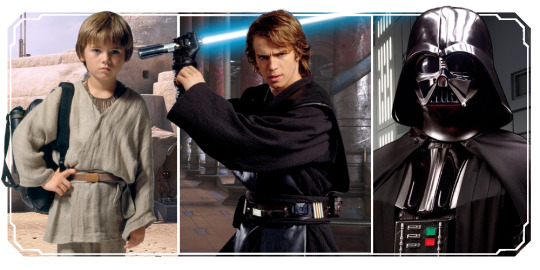
So when you switch from Episode II to Episode III, you can imagine a little asterisk that says, “more about the Clone Wars in the animated series” but it's only an asterisk because those specific stories don’t have anything to do with Anakin Skywalker, really.
In the films, they're skipped over. You hear about it, but you only see the very beginning and the very end of the wars.
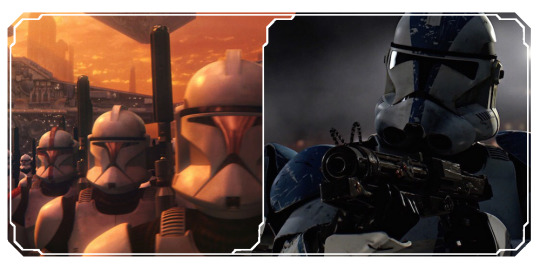
But whereas the features are Anakin Skywalker’s story, by contrast, The Clone Wars is basically a footnote in the saga (which is why George later decided to make it in an animated form, so it doesn’t get confused with the saga).
And just because those ideas don't have much to do with Anakin Skywalker's fall to the Dark Side, doesn't mean they're not worth sharing. Ignoring these tales would be sad because there’s so much stuff to explore.
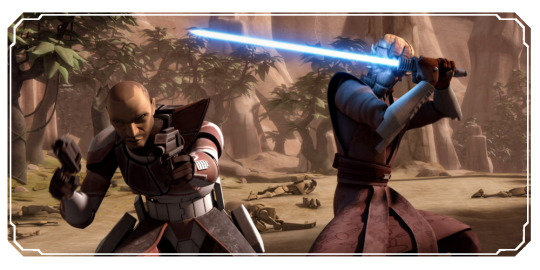
After all, this was a turning point for the Republic. So the show's stories deal with individual clones, we get to know them. Same thing with Jedi, who in the films only zip through real fast, and never get explored on a personal level.
Mostly, in terms of character development, this time-period develops Anakin and Obi-Wan's relationship.
In Episode II, they are not really that friendly, don’t get along very well, they’re very standoffish with each other. So the idea was to see how they become best friends, in Episode III, how they become partners, how they become a team of equals.
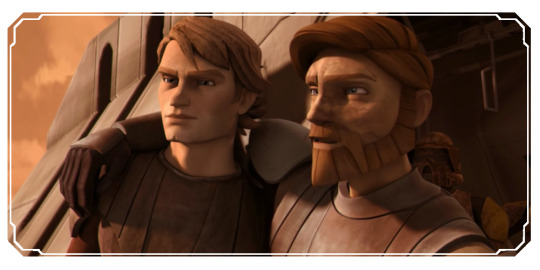
And with the series, you see that it's because they’ve been sort of been through the Clone Wars together. So this really helps build that relationship, something which is also facilitated by the creation of a new character to take the role of the younger person who is being taught, in these TCW stories.
In order to make Anakin a little bit more mature, (seeing as in Episode II, he was kind of a wild child) George gives him somebody to teach: Ahsoka Tano, his new Padawan, a young woman who holds her own with him.
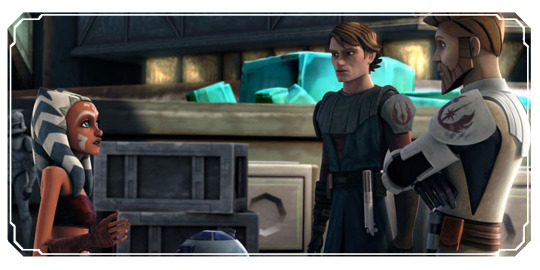
His reasoning is that, when you become a parent, when you become a teacher, you kind of have to become more responsible. It kind of forces you into this adulthood thing, it makes you more mature simply because you’ve, suddenly, got to be a good example for somebody younger than you are.
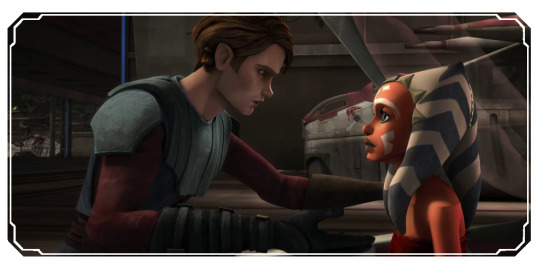
Thus explaining Anakin’s rise to being a fully-fledged Jedi, and why, in Episode III, his character is more settled down, and less petulant.
To conclude:
The Clone Wars is like a footnote to the live-action features. In this show, Anakin is simply a normal person, as well as a great Jedi Knight. In the movies, you never see Anakin as a normal person. He’s always struggling. Again, the films are about pivotal points in his life.
However, while throughout the Clone War, Anakin does has moments where he overcomes his attachments...
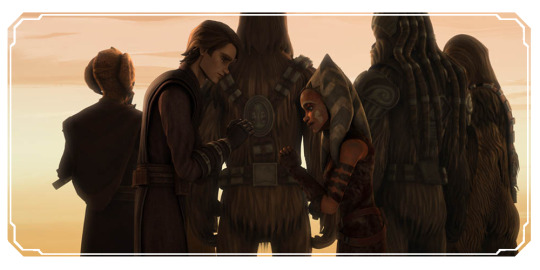
... and moments where he instead gives into his fear of losing them way too much...
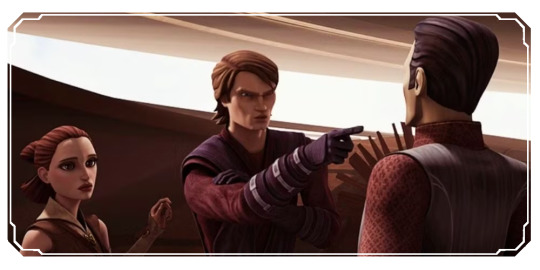
... even being warned against doing so by other Jedi (it's not as if this flaw went unnoticed)...
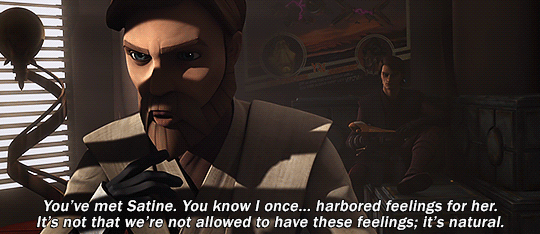

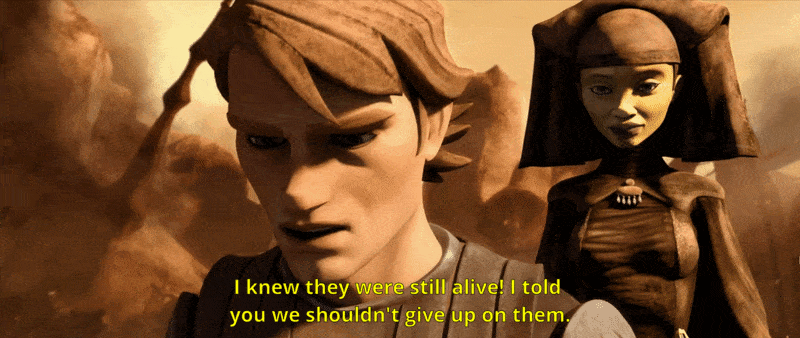
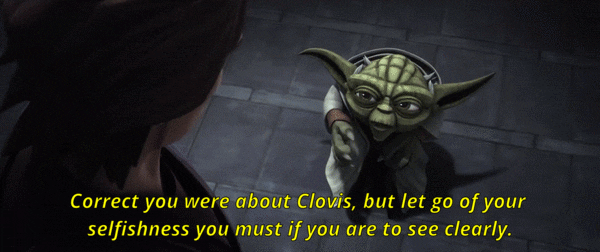
... but also encouraged by Palpatine into continuing down this path...
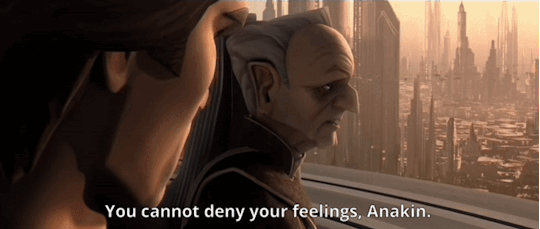
... at the end of the day, what this comes down to is something that Dave Filoni explained when talking about the narrative constraints of writing episodes for The Clone Wars:
Though Anakin may briefly overcome flaws, he never solves any of those problems fully.
He'll start embarking on a path of understanding, but can never take the final full step to being this more enlightened person, because he keeps getting pulled back down.
Which is why when we're talking about events that caused Anakin's downfall, I'd say that The Clone Wars counts... but in only in terms that all these events do is cement the path Anakin has begun to undertake in Episode II, through his lack of discipline, emotional unruliness and attachment.
For better or for worse. Nothing more, but also nothing less.
That includes something like Ahsoka leaving the Jedi Order. George Lucas was originally just gonna have her brought back into the Jedi and be done with it, it's Dave Filoni who insisted on that taking place because it was unexplored territory, narratively-speaking.
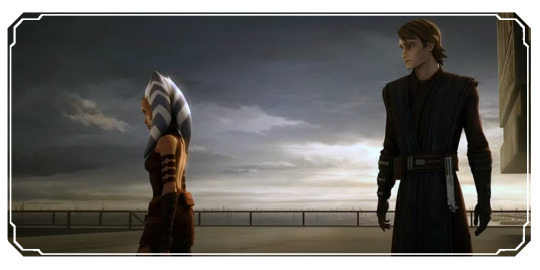
But in the context of the bigger Star Wars saga about the fall of Anakin Skywalker, a character like Ahsoka is inconsequential.
Because while The Clone Wars gives George the chance to get out of dealing with the psychological underpinnings of why somebody gets to be evil (as he does in the films) and show that, “Anakin was a regular guy,” just like he was in Episode I... it doesn’t really have anything to do with Anakin’s story, about his fall to the dark side.
Sources:
Attack of the Clones, Director’s Commentary, 2002
Gizmodo/io9, 2008
ScreenSlam, 2008
Parade, 2008
Contra Costa Times, 2008
ComingSoon.Net, 2008
Sky Movies, 2008
Star Wars - The Clone Wars (movie) - World Premiere, 2008
The Art of Star Wars: The Clone Wars, 2009
SciFiNow, 2011
Dave Filoni, “The Slaves of Zyggeria” video commentary, 2012
Dave Filoni, “The Wrong Jedi” featurette, 2012
#Anakin Skywalker#George Lucas#lucas quotes#collection of quotes#anakin#obi-wan kenobi#obi-wan#long post#meta#The Clone Wars#TCW#Star Wars The Clone Wars#Star Wars#CW#Palpatine#Ahsoka#Ahsoka Tano#General Skywalker
183 notes
·
View notes
Text
Part 2 of the 4-part post series interweaving George Lucas' words in a curated meta post. Here's PART 1, here's PART 2.5.
In George Lucas' words: The Fall and Return of Anakin Skywalker
- Episode II -
Anakin's status quo at the start of the film.
In Episode II, Anakin is a teenager. A petulant, whiny, pain in the ass teenager, and I hate to say it, but that's what a lot of teenagers are!
He is a little cocky, a little sure of himself, and constantly chafing a little bit with Obi-Wan. That said, it's worth pointing out that Obi-Wan and Anakin actually like each other.
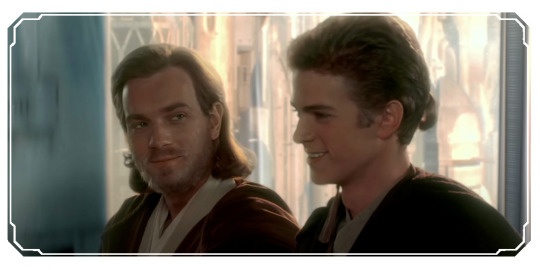
Their introduction scene was, in fact, a reshoot, that came from George wanting to emphasize the fact that the two are partners and friends, and even though there’s a little bit of tension between the two of them, throughout the film, where they're at each other's throats, they do have a history of warm friendship, off-screen.
Even though Obi-Wan is a "stern taskmaster" and mentor, he still cares about Anakin. And he’s more frustrated with their relationship and Anakin’s unwillingness to go along with the rules, whereas Anakin feels he is being held back by Obi-Wan.

They both have a point. Because while Anakin is indeed a gifted person, very talented, there is a constant dichotomy of "Anakin's lack of discipline vs his natural talent" at play.
In every set-piece, we think that [Anakin's] gone a little bit too far and made a mistake, and then you realize that he’s actually very clever. And then, sometimes, it's the opposite. We think he's got this, and actually... he doesn't.
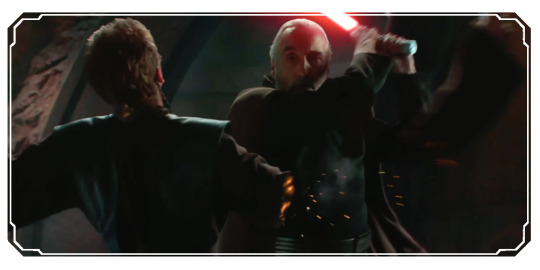
The fact is that, being the Chosen One, Anakin is slightly more powerful than other people, which means he is slightly ahead of himself at all times.
We also get a little sense that Anakin has some relationship with Palpatine and that he likes Palpatine, his other mentor figure.
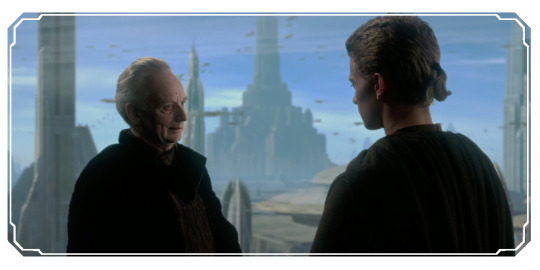
The chancellor's place in Anakin's life isn't helpful, as we can see that Palpatine is sort of boosting his ego to make him feel that he's better than possibly he really is.
A lot of Anakin's philosophies and some of Anakin's dialog later on - about how he should be allowed more freedom, more assignments - come from Palpatine.

So on the one hand, things aren't perfect. For someone in Anakin's situation, the ability to do evil is much easier to come by. The issues he struggles with are the same issues that everybody struggles with, the fact that sometimes they don’t consider the consequences of what they’re doing because it’s not expedient.
On the other hand, Anakin is still essentially a good kid, and he's determined to be greatest among the Jedi. It's not that he has evil intentions, but in this film we see how he's under some pressure and we start to realize that some new temptations are coming his way.
These new temptations come in the shape of:
the nightmares of his mother
and the reunion with his beloved Padmé.
Anakin & Padmé - from attraction to love
When Padmé re-enters his life, the film shifts into a story about Anakin's dealing with his emotions, the difficulty of his being torn between his duty as a Jedi who swore to serve the Republic, and his emotional needs, which relate to Padmé.
Back in Episode I, Anakin had a crush on her when he was little. She dismissed him because he was just a little kid, but she liked him, like as with a puppy. Now, she’s grown up. And she's beginning to see him as an attractive young man.

As they are paired together, we go back and forth between them - as two young people having feelings for each other - and them, in the context of her position as a Senator, and his position as a Jedi.

She's more disciplined, whereas he's naive, especially around her. He's never been in a situation like this before, so he’s falling in love, but he doesn’t really know it. And it is forbidden.
There are social barriers that have been put up and there's a practical reality of what would happen to them in the future, if they were to let their emotions run wild.

They're both government officials who have made a commitment toward the Republic and its citizens. Seeing as neither of them is willing to quit, duty dictates that they renounce their love, and dedicate their lives selflessly to carrying on with their responsibilities.
After he spills his guts out to her and she refuses to go along with him, Anakin does realize that, yes, this would not be a good idea… because it would jeopardize his career, it'd jeopardize her, and it probably wouldn't be a good thing.

But they do love each other. They’re truly in love with each other.
It’s the issue of "true love over duty." It’s really the "Romeo and Juliet" aspect of it, of a doomed relationship, in more ways than one really.
And eventually... they give in. This culminates with an idyllic situation on Naboo, where Anakin and Padmé are getting married in what appears to be a somewhat happy ending.

But Anakin and Padmé's marriage is not gonna work. It is a complex, slightly dysfunctional relationship because, to Anakin, she’s much more than a wife. And it will only become clear too late to Padmé that she married the wrong guy.
It's only when you put it in the context of the bigger story that you see the handwriting on the wall.

You notice flaws in Anakin's personality that are going to sink him in the end, as hinted by his metal hand, and the fated "Darth Vader influence" it implies.
Anakin & Shmi - from love to attachment
When we're talking about Anakin's flaws, many of them are established in Episode II.
His emotions run amok... moreso now that he's falling in love.
He's undisciplined... as teenagers tend to be.
He's arrogant... but with exceptional powers like his (and the constant egging on from Palpatine), it's easy to see why.
However, there is, one flaw that comes back to haunt him, all the way back from Episode I. Anakin has a fear of losing things, namely the fear of losing his mother.
The fact that everything must change and that things come and go through his life and that he can’t hold onto things is a basic Jedi philosophy that he isn’t willing to accept emotionally.

And as a result, he wants to begin to control things, he wants to become more powerful. And these are not Jedi traits.
Part of the reason for this flaw is because he was raised by his mother rather than the Jedi.
He started to be trained so late in life, that he had already formed these attachments. And for a Jedi, attachment is forbidden. You can love people, but you have to love them unconditionally, in terms that you can’t hold on to them.
If he’d have been taken in his first year and started to study to be a Jedi, he would have been trained to love people without getting attached to them.

But Anakin has confused possessive love with compassionate love.
Because he was unwilling to let go of his mother, because he was so attached to her, he committed this terrible revenge on the Tusken Raiders. This is the first act that ultimately takes him on the road to the Dark Side.

And in the aftermath of this... he is very sad and depressed. Horrified at his actions.
But what he’s really upset about is the fact that he’s not powerful enough. He voices jealousy and anger at Obi-Wan, he blames everyone else for his inability to be as powerful as he wants to be, and he hears all the time from Palpatine that he will be.
He tells himself that "if he had more power, he could’ve kept his mother, he could’ve saved her and she could’ve been in his life."

Down the line, he will also become attached to Padmé and these things are - for a Jedi, who needs to have a clear mind and not be influenced by threats to their attachments - a dangerous situation.
Because whereas a good Jedi overcomes their flaws and kinda goes above the normal human tragedy that most people have to experience, Anakin doubles down on this crucial flaw, which feeds into his fear of losing things, and grows into greed and wanting to keep his "possessions," and things that he should be letting go of.
Sources:
Attack of the Clones Commentary Tracks #1 and #2, 2002
Mythmaking: Behind the Scenes of 'Attack of the Clones', 2002
Primissima, p. 32, May Issue, 2002
LA Times, 2002
CNN, 2002
Attack of the Clones, “Story” Featurette, 2002
Starlog Magazine #337, 2005
Rolling Stone, 2005
The Star Wars Archives: 1999-2005, 2020
#Anakin Skywalker#George Lucas#lucas quotes#collection of quotes#jedi order#star wars#anakin#shmi skywalker#Padmé Amidala#obi-wan kenobi#obi-wan#long post#meta#attack of the clones#AOTC#Episode II#Star Wars#palpatine#anidala
91 notes
·
View notes
Text
Back in 2021, @writerbuddha wrote this amazing post where he interweaved Lucas' words in his meta post defending the Jedi. I'd like to take a page out of their book and start a 4-part series of posts on Anakin. Here we go!
In George Lucas' words: The Fall and Return of Anakin Skywalker
- Episode I -
Episode I exists to show us that Anakin Sykwalker makes it into Jedi school, becomes free, and realizes his dream. But in the process, he has to go through a lot of painful sacrifices.
When we meet Anakin, he is a young slave boy who dreams of becoming a Jedi. Lucas makes it a point that, he’s a really wonderful, angelic little kid.

This is intentional. The reason George started the story where he did. He played with having Anakin start out in his late teens like Luke, or age him down to twelve-years-old. The problem was that a twelve-year-old leaving his mother - as Anakin does - is not nearly as traumatic as a nine-year-old leaving his mother. And there is a key story point that revolves around the fact that he was separated from his other at an early age, and how that has affected him.
The whole point of Anakin’s arc in the Prequels is that Anakin is a normal, good kid. And how does somebody who is normal and good turn bad? What are the qualities, what is it that we all have within us that will turn us bad?”

Well, Anakin has some flaws - and those flaws ultimately do him in. Those flaws are hard to see in Episode I, but they are there. He’s cursed by the same flaws, and issues that he has to overcome, that all humans are cursed with. There's a lot going on there.
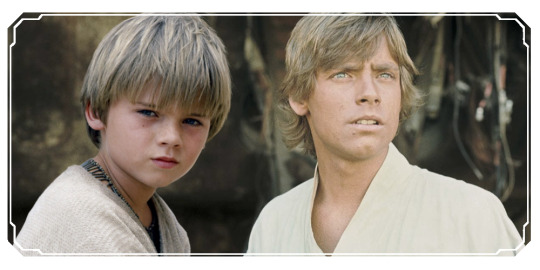
In Episode I, we see that there are a lot of parallels between Luke and Anakin. In Episode IV, Luke does struggle with his commitment to his uncle and his commitment to a larger destiny. His heart is to go and go off on this adventure, but he's caught in his obligations to the mundane, so to speak.
Eventually, Anakin takes a different road than his son takes, but it’s been set-up for you to almost expect that they will go— that Luke will follow in his father’s footsteps. Once again, these are issues that Anakin, Luke, and anyone can confront.

After all, once he liberates himself through a Podrace, Anakin is confronted with the fact that he will need to leave his mother, Shmi, behind. Shmi is caught in a struggle. She loves her son, but she wants a better life for him and has to let him go.
So she does. Right off the bat, the first movie shows Anakin’s mother display a type of selfless love - which Lucas refers to as “compassion” - that Anakin will only really be able to learn in the last movie.
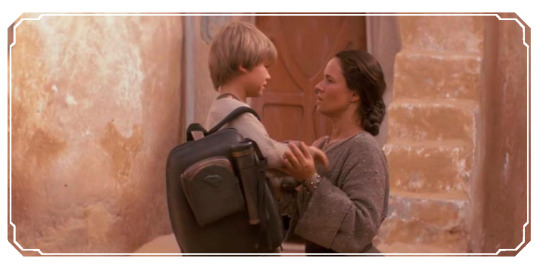
Now, when they get to Coruscant, Anakin needs to be tested to allow him to be accepted as a Jedi, eventually. Because he has the powers… but as Yoda points out, there’s a lot of fear in him, and anger. That’s why they actually deny him the chance to become a Jedi. But it’s also - when they relent later on - it’s the thing that ultimately begins to describe some of his downfall.

In theory, the child should have been trained by Yoda until he was about seven or eight years old. And then when he was seven or eight, he'd be given a Jedi, he'd become the Padawan learner to a Jedi.
But Qui-Gon wants Anakin to skip the early training and jump right to taking him on as his Padawan learner, which is controversial, and ultimately, the source of much of the problems that develop later on.
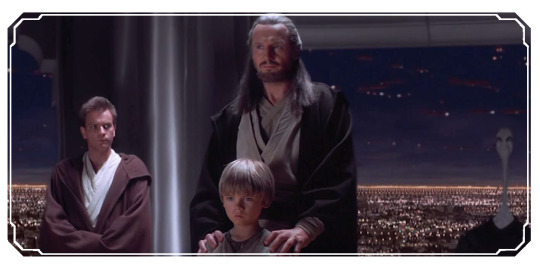
It is obvious that Qui-Gon is wrong and made a dangerous decision, but ultimately this decision may be correct. Anakin is indeed the chosen one.
That doesn't mean that the Council's prediction is wrong. The tale meanders and both the prediction and Qui-Gon are correct. Anakin will be taken over by dark forces which in turn destroy the balance of the Galaxy, but the individual who kills the Emperor is Darth Vader— also Anakin, who brings peace at last with his own sacrifice.
Once Qui-Gon dies, ironically enough, it’s Obi-Wan that has to train Anakin and take care of him and take over the responsibility that Qui-Gon has started. The Jedi Council let Anakin in and they make him Obi-Wan's Padawan.
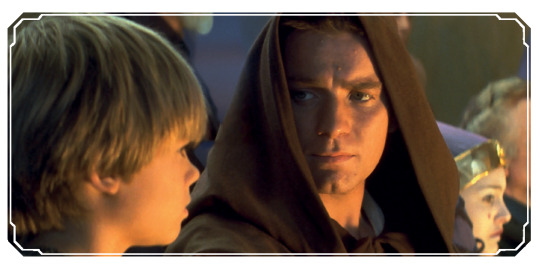
Sources:
The Phantom Menace Commentary Tracks #1 and #2, 1999
Cut Magazine, 1999
Premiere, 1999
The Making of The Phantom Menace, 1999
Star Wars Insider #52, 2000
A New Hope, Commentary Track, Special Edition DVD, 2004
The Making of Revenge of The Sith, 2005
The Cinema of George Lucas, 2005
Starlog Magazine #337, 2005
BONUS: How George describes Obi-Wan's initial thoughts on Anakin
Throughout the film, Obi-Wan is at odds with Qui-Gon, who rebels against the Jedi rules. So when he meets him, Obi-Wan does not trust Anakin. He’s not a big fan, he has a suspicion, this initial skepticism toward Anakin which is why Lucas didn't want to overplay the scene where they first meet.
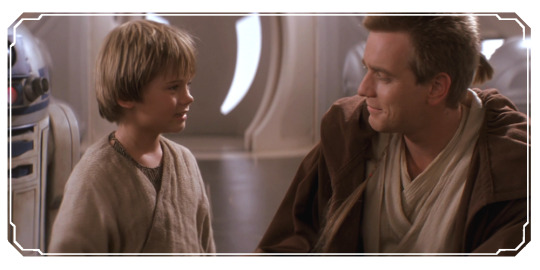
He’s like the reluctant elder brother saying, “You’re not leaving him with me. I don’t want to babysit anymore, I want to go out and do something good.”
Qui-Gon and Obi-Wan disagree about using what one would call in mythological terms "the guide." One believes in the guide. The other one doesn't. Obi-Wan’s argument is that taking on characters like Jar Jar or Anakin with them on the trip is “going to slow us down. This is not a wise thing to do.”

It's a classic mythological motif but at the same time, it's conflict. The characters have to grow so what happens is that eventually the character that is very much against doing this has the obligation transferred to them.
So by the end of the film, Obi-Wan has become Qui-Gon, by taking on his rebellious personality and responsibilities.

Obi-Wan commits, and tells Anakin that he’s going to train him. He has character and takes responsibility. Han Solo would’ve left him out on a desert planet somewhere.
Sources:
The Phantom Menace Commentary Tracks #1 and #2, 1999
The Making of The Phantom Menace, 1999
The Making of Revenge of The Sith, 2005
The Star Wars Archives: 1999-2005, 2020
#reblogging because of the updated visuals#and part 2 is coming out tomorrow ;)#anakin skywalker#george lucas
178 notes
·
View notes
Text
Seeing what they're doing to Rachel Zegler is so sad.
Most people are saying she's just "reaping what she sowed when she made those woke comments back in 2022" and aside from the fact that - really? Snow White is the Holy Grail movie that can't be commented on? - like... you realize that when you're on a promotional tour, you're being fed those lines by PR people, right?
To be clear: I'm not necessarily saying those weren't her actual opinions, I'm saying that when you're doing the rounds, you're encouraged by the studio to say that stuff more, you're given a line and you repeat it, because it helps generate controversy, it gets butts in seats etc etc. And the studio tells you they have your back. Right? Wrong.
What we're seeing is the equivalent of like, an older kid telling his little brother to steal a toy from a shelf, "i've got your back", and when the little bro is OBVIOUSLY stopped by a security guard (because he's no professional thief), big bro not only isn't anywhere to be found, but also tattled on him to the security guard in the first place.
The truth is, Snow White isn't failing because of Zegler or Gadot for that matter. Nobody's going to see Snow White because - after so many "just okay/by-the-book/corporate-packaged" movies that cost $30-$80 at an AMC, popcorn included - nobody has the time or the money to go watch fucking Snow White of all things.
But let's not acknowledge this, God forbid, because then we'd have to start acknowledging that
the bulk of the moviegoing audience has wisened up, they know that any controversial castings and comments are just there to generate controversy and that's it, because the corporations cranking these films out never really stand by their political stances.
which means the moviemaking formula is broken, and it now takes more than just slapping two big stars on a poster and putting a lot of money in a budget to get people to come watch your film. No, now you need good stories, with LESS studio meddling and test screenings. There's a reason people keep turning to A24 films and high-concept shows.
But considering how in 2023, the studios opted to operate on a loss rather than engage in good faith with screenwriters on getting paid fairly, it's clear "writing a good story" isn't the priority.
91 notes
·
View notes
Text
Crazy to me that this of all things is what makes me type out a post when I have so many in drafts just waiting to be completed but hey. Gotta vent. Here goes.
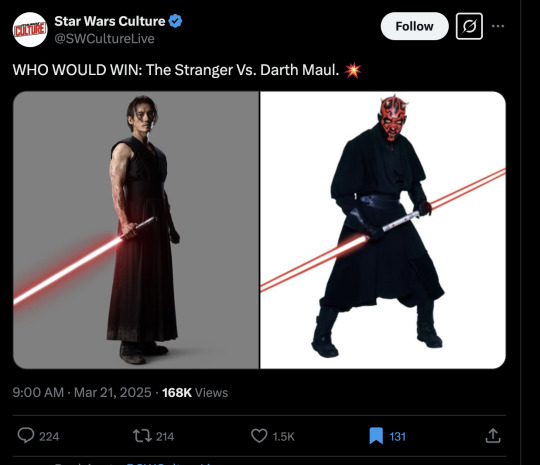
Everyone was commenting in bad faith, in the comments and X is where intelligent discourse goes to perish, so taking this seriously (or as seriously as a "who would win" debate can allow):
This could go either way!
On the one hand, yes, Maul is the more skilled fighter.
Sure, technique-wise, Qimir is very skilled... but he fights like "a mean Jedi who cheats in a fight."
Maul-- *Darth Maul fights like a Sith Lord. He's been trained the old fashioned Sith way from a very early age.
From a narrative POV too, this tracks.
Qimir's master is Plagueis, essentially a Sith whose interest and focus is in science and the occult. He taught Sidious just enough for the latter to master the seven forms, then went back to his research.
Sidious, on the other hand, was a political animal who NEEDED a more fighting-savvy apprentice to do the dirty work in the shadows, and thus molded Maul to be such a weapon.
And you see this too in how either fighter maintains control of a duel.
I'd rank Sol and Qui-Gon at a comparable level.
We see that when Sol gets either angry OR focused, Qimir finds himself at a disadvantage and begins to falter, either retreating or drastically changing tactics. Qimir loses both those fights.
Compare with how Maul handled Qui-Gon in either of those states. He lets Qui-Gon rush at him, then resorts to dirty tricks when Qui-Gon is in a more defensive state. That's how a Sith does it. That's why Maul wins.
HOWEVER! Maul has a flaw that he never, ever outgrows.
In a situation where he's superior, he gets arrogant. He gets cocky. He takes his sweet time to gloat and do the flips and whirl the saber and taunt his prey.
It's why Obi-Wan almost always beats him. It's why Ahsoka, an inferior fighter, beats him too. It's why he didn't see Sidious coming.
Like a true Sith, Maul's overconfidence is his weakness.
You know who doesn't have that weakness?
The guy who does have Jedi training. Who put in the work and already outgrew his own ego and arrogance.
Friggin' Qimir.
Who is seen pulling off no-bullshit kill after no-bullshit kill. Screw the pageantry, screw a clean win.
Padawan breaks his mask? Stabbed in the heart.
Jedi attacks him by surprise? Breaks his neck.
Multiple Jedi attack him? Trakata moves left and right until they're all dead.
So Qimir is a more calculating and focused fighter.
Which means that what a duel between the two comes down to is external circumstances. Their levels aren't so distant that Maul would blitz the Stranger, this would be a long duel.
That said, Qimir is more likely to die in the heat of battle.
But if Maul merely wounds him? Then 9 times out of 10 he'll hang around and gloat, which is something Qimir would capitalize on to deliver a killing blow.
Procrastination over, venting complete.
#3 scripts unfinished whose deadline is next week but no#had to write caffeine high procrastination post number 14235467#qimir#the stranger#darth maul#maul#the acolyte#sith#sith lord#sith apprentice#star wars
191 notes
·
View notes
Text
Back in 2021, @writerbuddha wrote this amazing post where he interweaved Lucas' words in his meta post defending the Jedi. I'd like to take a page out of their book and start a 4-part series of posts on Anakin. Here we go! Here's PART 2 and PART 2.5 !
In George Lucas' words: The Fall and Return of Anakin Skywalker
- Episode I -
Episode I exists to show us that Anakin Sykwalker makes it into Jedi school, becomes free, and realizes his dream. But in the process, he has to go through a lot of painful sacrifices.
When we meet Anakin, he is a young slave boy who dreams of becoming a Jedi. Lucas makes it a point that, he’s a really wonderful, angelic little kid.

This is intentional. The reason George started the story where he did. He played with having Anakin start out in his late teens like Luke, or age him down to twelve-years-old. The problem was that a twelve-year-old leaving his mother - as Anakin does - is not nearly as traumatic as a nine-year-old leaving his mother. And there is a key story point that revolves around the fact that he was separated from his other at an early age, and how that has affected him.
The whole point of Anakin’s arc in the Prequels is that Anakin is a normal, good kid. And how does somebody who is normal and good turn bad? What are the qualities, what is it that we all have within us that will turn us bad?”

Well, Anakin has some flaws - and those flaws ultimately do him in. Those flaws are hard to see in Episode I, but they are there. He’s cursed by the same flaws, and issues that he has to overcome, that all humans are cursed with. There's a lot going on there.

In Episode I, we see that there are a lot of parallels between Luke and Anakin. In Episode IV, Luke does struggle with his commitment to his uncle and his commitment to a larger destiny. His heart is to go and go off on this adventure, but he's caught in his obligations to the mundane, so to speak.
Eventually, Anakin takes a different road than his son takes, but it’s been set-up for you to almost expect that they will go— that Luke will follow in his father’s footsteps. Once again, these are issues that Anakin, Luke, and anyone can confront.

After all, once he liberates himself through a Podrace, Anakin is confronted with the fact that he will need to leave his mother, Shmi, behind. Shmi is caught in a struggle. She loves her son, but she wants a better life for him and has to let him go.
So she does. Right off the bat, the first movie shows Anakin’s mother display a type of selfless love - which Lucas refers to as “compassion” - that Anakin will only really be able to learn in the last movie.

Now, when they get to Coruscant, Anakin needs to be tested to allow him to be accepted as a Jedi, eventually. Because he has the powers… but as Yoda points out, there’s a lot of fear in him, and anger. That’s why they actually deny him the chance to become a Jedi. But it’s also - when they relent later on - it’s the thing that ultimately begins to describe some of his downfall.

In theory, the child should have been trained by Yoda until he was about seven or eight years old. And then when he was seven or eight, he'd be given a Jedi, he'd become the Padawan learner to a Jedi.
But Qui-Gon wants Anakin to skip the early training and jump right to taking him on as his Padawan learner, which is controversial, and ultimately, the source of much of the problems that develop later on.

It is obvious that Qui-Gon is wrong and made a dangerous decision, but ultimately this decision may be correct. Anakin is indeed the chosen one.
That doesn't mean that the Council's prediction is wrong. The tale meanders and both the prediction and Qui-Gon are correct. Anakin will be taken over by dark forces which in turn destroy the balance of the Galaxy, but the individual who kills the Emperor is Darth Vader— also Anakin, who brings peace at last with his own sacrifice.
Once Qui-Gon dies, ironically enough, it’s Obi-Wan that has to train Anakin and take care of him and take over the responsibility that Qui-Gon has started. The Jedi Council let Anakin in and they make him Obi-Wan's Padawan.

Sources:
The Phantom Menace Commentary Tracks #1 and #2, 1999
Cut Magazine, 1999
Premiere, 1999
The Making of The Phantom Menace, 1999
Star Wars Insider #52, 2000
A New Hope, Commentary Track, Special Edition DVD, 2004
The Making of Revenge of The Sith, 2005
The Cinema of George Lucas, 2005
Starlog Magazine #337, 2005
BONUS: How George describes Obi-Wan's initial thoughts on Anakin
Throughout the film, Obi-Wan is at odds with Qui-Gon, who rebels against the Jedi rules. So when he meets him, Obi-Wan does not trust Anakin. He’s not a big fan, he has a suspicion, this initial skepticism toward Anakin which is why Lucas didn't want to overplay the scene where they first meet.

He’s like the reluctant elder brother saying, “You’re not leaving him with me. I don’t want to babysit anymore, I want to go out and do something good.”
Qui-Gon and Obi-Wan disagree about using what one would call in mythological terms "the guide." One believes in the guide. The other one doesn't. Obi-Wan’s argument is that taking on characters like Jar Jar or Anakin with them on the trip is “going to slow us down. This is not a wise thing to do.”

It's a classic mythological motif but at the same time, it's conflict. The characters have to grow so what happens is that eventually the character that is very much against doing this has the obligation transferred to them.
So by the end of the film, Obi-Wan has become Qui-Gon, by taking on his rebellious personality and responsibilities.

Obi-Wan commits, and tells Anakin that he’s going to train him. He has character and takes responsibility. Han Solo would’ve left him out on a desert planet somewhere.
Sources:
The Phantom Menace Commentary Tracks #1 and #2, 1999
The Making of The Phantom Menace, 1999
The Making of Revenge of The Sith, 2005
The Star Wars Archives: 1999-2005, 2020
#Anakin Skywalker#George Lucas#lucas quotes#collection of quotes#jedi order#star wars#anakin#shmi skywalker#qui-gon jinn#obi-wan kenobi#obi-wan#long post#meta#the phantom menace#TPM#Episode I#Star Wars
178 notes
·
View notes
Text
to me there's really something about belonging to a generation of children whose star wars was the prequels, not the originals, not the sequels, whose shared formative childhood myth was not a hopeful one that ended in the defeat of evil and the birth of freedom, but rather a tragic one that took us halfway and dropped us in hell, at the nadir of civilization. lucas showed us to beware of greed, and the hardening of the hearts in fear and self-interest, the mechanization of people acting without empathy, the failure of mutual aid and symbiotic relationships. he depicted it in the way anakin chose his personal power and family over the good of everyone, becoming a fascist enforcer more machine than man, and the way palpatine first made the government worse and then instigated a war in order to get people to beg him to make it better through unilateral action. lucas warned us kids that money in politics would lead to liberty dying with thunderous applause, the empire rising, the jedi dying, the birth of the dark times. ultimately we have to borrow hope from baby luke to even put a glimmer of light at the end of the tunnel, but his very infancy puts a clock on how long we have to endure the darkness. this is our shared childhood myth, one of ruin. at least it's a story that gave us a vocabulary and mental model to understand what's happening, but god i wish we were the ones who got to dance with the fucking ewoks on endor's moon instead
1K notes
·
View notes
Text
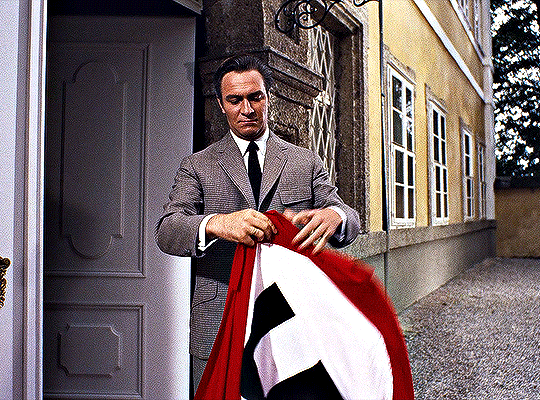

The Sound of Music (1965) dir. Robert Wise
99K notes
·
View notes
Text

Illustration from the amazing Luigi Ianelli, colored by Guillermo R. Vallejos and myself.
37 notes
·
View notes